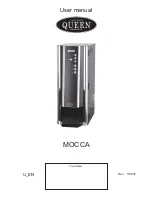
21
RECIPE TIPS
(CONTINUED)
High-Altitude Baking
In high-altitude areas, over 3,000 feet, dough tends to rise faster as there is less
air pressure. Therefore, less yeast is necessary. For more information on High
Altitude Baking guides contact:
Colorado Cooperative Extension Resource Center
Toll free: (877) 692-9358
E-mail: CERC@vines.colostate.edu
Website: www.ext.colostate/edu/depts/coopext
In dry climates, flour is drier and requires slightly more liquid.
In humid climates, flour is wetter and will absorb less liquid. Therefore less
liquid is required.
Slicing and Storing Bread
For best results,
place the bread on a wire rack and allow to cool for
15 to 30 minutes before slicing. Use an electric knife or a serrated knife for
even slices. For rectangular slices, place the loaf on its side and slice across.
Store unused bread tightly covered, (sealable plastic bags or plastic containers
work well) at room temperature for up to 3 days. For longer storage, (up to 1
month) place bread in a tightly covered container in the freezer. Since
homemade bread has no preservatives, it tends to dry out and become stale faster
than commercially-made bread.
Leftover or slightly hardened bread may be cut into 1/2-inch or 1-inch cubes and
used in recipes to make croutons, bread pudding or stuffing.
Measurement/Conversion Chart
1-1/2 tsp
=
1/2 TBL
8 TBL
=
1/2 cup
3 tsp
=
1 TBL
12 TBL
=
3/4 cup
1/2 TBL
=
1-1/2 tsp
16 TBL
=
1 cup
2 TBL
=
1/8 cup
3/8 cup
=
1/4 cup + 2 TBL
4 TBL
=
1/4 cup
5/8 cup
=
1/2 cup + 2 TBL
5 TBL+ 1 tsp
= 1/3 cup
7/8 cup
=
3/4 cup + 2 TBL
TR2200C 11/17/03 12:30 PM Page 27
















































